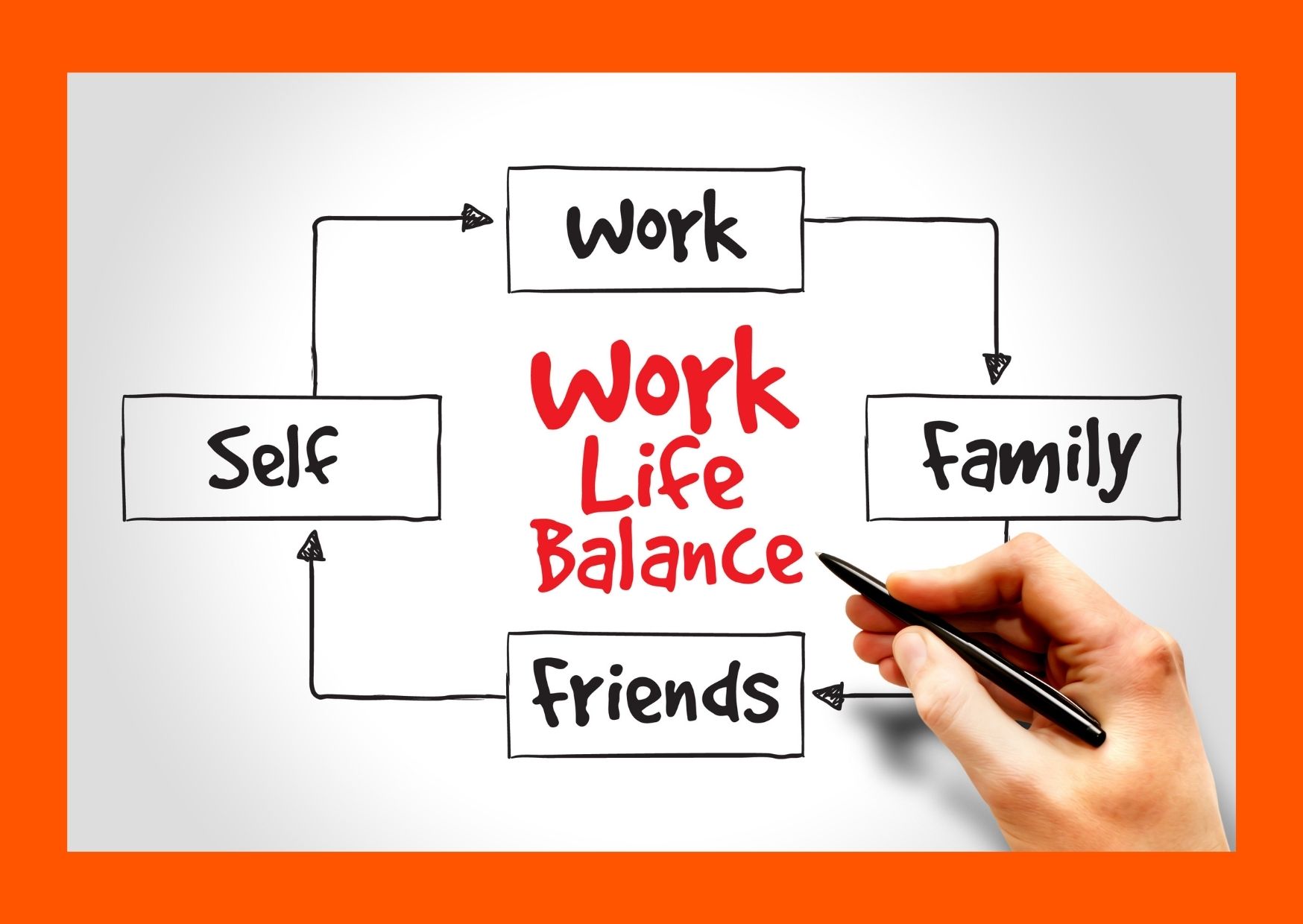National Work-Life Week 2022
What is National Work-Life Week?
National work-life week is another opportunity for employers to support the health and wellbeing of their employees and promote a healthy work-life balance.
This week is designed to highlight the importance of creating a healthy balance between our working life and our personal life.
Employers can host events to promote this, such as workshops, webinars, or fun events and activities for staff wellbeing.
According to Statista, more than 65% of UK workers are not happy with their work-life balance.
With only 34% of Gen Z, 34% of Millenials, 32% of Gen X, and 28% of Boomers stating they had a healthy work-life balance.
When is National Work Life Week 2022?
This year National work-life week is on October 11th – 15th 2022
This event is usually held in the second week of October and is a great way for employers to raise awareness about maintaining a positive and balanced working life.

What does work-life balance mean?
Work-life balance is defined as “The division of one’s time and focus between working and family or leisure activities”
This can look different for all of us because we all have different lives. For some, it may look like having the ability to complete daily work tasks while maintaining a happy household and catering to the needs of our child or children.
For others, it may mean having the ability to socialise and meet up with friends or family, while not having to work overtime or think about employee duties after working hours.
Depending on our situations, work-life balance looks different for us all.
What ideas can employers do for National Work-Life Week?
Employers have a duty to take care of the health and wellbeing of their employees and National Work Life week most definitely falls within this remit.
4 ideas for employers to support employees during National Work-Life Week.
- Hire an On-site chair massage therapist.
Chair massage is a fantastic way to help relax, reset and take a break from work. Having a service like this during working hours allows employees to take a step away from their desks and take some time out to be pampered by an expert massage therapist.
On-site Chair Massage has been shown to:
- Reduce stress
- Relax the body and mind
- Reduce tight muscles
- Decrease muscular tension
- Improve mood
- Boost endorphins
- And more!

- Give employees an additional day off.
This might sound like a crazy idea but hear me out.
Employees who feel valued and appreciated by their employer are more likely to stay working within their organisation.
It costs a company approximately 33% of an employee’s annual salary if they chose to leave.
Giving employees an extra day off is just another way to show them that you care about their health & wellbeing as well as the balance between their working and personal life.
- Provide informative, interactive, fun & educational training
By nature, humans are naturally curious. Many of us want to learn new things and take on new, fun, and exciting information.
Some of us crave competitive and demanding challenges, while others are happy to just coast along and learn what is necessary.
Providing fun and interactive training around a range of topics can help to support employees during national work-life week.
Whether it’s an engaging wellbeing webinar on coping with stress, or whether it’s an interactive and engaging workshop, these are fantastic ways to support employees.
Some companies may even have staff members who are passionate and knowledgeable about specific topics who are willing to host sessions and deliver training.
Using someone internally is a great way to encourage staff members while also saving costs for the business.

- Implement new initiatives focused on work-life balance
It’s great having companies and organisations host wellbeing events and services for the different wellbeing calendar events throughout the year, but employees often like to see ongoing support.
This ongoing support could be in the form of subsidised gym memberships, mentor programmes, accountability groups, weekly fitness classes, workplace boxing, or other positive initiatives that you feel are relevant for your company or organisation.
Some other initiatives include:
- Providing healthy snacks
- Making lunch breaks mandatory
- Organising social activities
- Creating company exercise challenges
- Creating employee recognition programmes
- Providing personal development training
- Arranging topical wellbeing webinars
- Allowing flexible working hours
- Creating employee volunteering initiatives
5 tips for employees to manage work-life balance
- Ask for help
For some of us, asking for help can seem like a task within itself. Some of us are fearful of rejection, some of us don’t want to be a burden and some of us feel there is no point because the thing we’re asking for, won’t get done to the standard we like.
It’s time we change our attitude towards asking for help and here’s why.
Asking for help can:
- Build connections
- Increase productivity
- Provide an opportunity to learn
- Make others happy
- Create a positive culture
These are just a few of the benefits of asking for help.
According to Psychologist Cheryl Gale, asking for help can make others happy as it provides an opportunity for others to share information.
People who share information are often perceived as more trusting and helping others can help them to feel good about themselves.
So try not to deny anyone the opportunity to help you, if you need it. And try to recognise when you need help.
- Learn to say no
Some of us have a hard time saying no and this can often leave us feeling overwhelmed, anxious, irritable, or other similar emotions.
Saying no can feel difficult at times, some of us have a fear of conflict, and some of us don’t want to disappoint or hurt someone’s feelings.
Whatever the reason we’re scared to say no, we need to start to learn how to say no, when we don’t really want to say yes.
To help us start to learn to say no, psychologists suggest trying a few different techniques.
These include:
- Practicing saying no in small, unimportant situations, that will not have an impact on friends, family, or loved ones. This may include not buying something at the supermarket, or saying no to the person at the station who offers you a free paper.
- Taking a deep breath before saying yes. This helps to give you a little bit of time to assess the opportunity and respond to your own needs
- Assess the fallout. How bad will it be if you say no? Will your company fire you if you don’t take on the extra work that you can’t dedicate the time to complete to the best of your ability? (It’s unlikely)
- Remember that in many scenarios you can change your mind. Saying no initially may be the best option and if applicable you can change your mind later.

- Ask for flexibility
Flexible working hours are becoming more and more important when it comes to finding a job that works for us.
Flexible working hours is another way that we can cater to our work-life balance needs.
Asking our employer or boss or company for a more flexible working schedule is another way we can help to ensure we’re having a balanced work-life schedule.
In the UK, all employees have the legal right to request flexible working hours.
For an employer, having flexible working can help to:
- Attract a wider range of employees
- Retain talent
- Reduce costs
- Reduce absenteeism and sick days
- Increase productivity
- And more!
Being the employee that requests flexible working hours may just be the kickstart your organisation needs in its quest to become a better workplace and better business.
- Prioritise health
Our health and wellbeing are vital to our working and personal life. Without good health, we’re unable to deliver the things that we set out to achieve.
Most of us have been there when we’ve had to take time off work or social events because we’ve been sick.
We must prioritise the things that keep us healthy, both physically and mentally.
In the words of Joyce Sunada “If you don’t make time for your wellness, you will be forced to make time for your illness”
Some individuals choose to take care of their health by ensuring they have a consistent exercise routine, some ensure they have a balanced diet, others commit to getting sunlight every day.
Whatever you find works to help keep you happy and healthy needs to remain a priority.

- Communicate boundaries
Boundaries are important in all aspects of our life. If we don’t set boundaries, it’s possible, we’ll continuously be at the mercy of others.
Setting boundaries helps us to establish connections, foster positive relationships, reduce anger and resentment, learn to put ourselves first, and more!
Having clear boundaries can also help us to maintain a positive work-life balance.
Throughout our working life, setting boundaries lets our employers, colleagues, and managers know where we stand within certain situations.
If you need to collect the kids from after school club at 6 pm and your manager is always asking you to work late, it’s important that you set the boundary of finishing on time, to ensure your personal life matters are attended to.
If we don’t set clear boundaries, this may have an impact on personal life, which in turn impacts our work-life balance.

Author –
Tyler Lowe – Health & Wellbeing Speaker
BSc Sport & Exercise Rehabilitation

